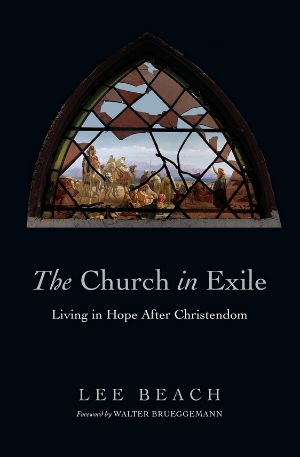Living in hope after Christendom
Worthwhile, thought-provoking and practical work about the Church returning to its roots of exile
 The Church in Exile: Living in hope after Christendom
The Church in Exile: Living in hope after Christendom
By Lee Beach
IVP USA
ISBN: 978-0830840663
Reviewed by Ivan King
This work by Lee Beach offers two main arguments. The first is that both Old and New Testaments support the contention that ‘exile’ is a normative condition and experience for the people of God. Although Beach draws on wider social analysis, the bedrock of his argument is scripture and the applied theology arising from this.
He begins by describing and exploring a theology of exile. This is grounded in the stories of Esther, Daniel and Jonah and seen worked-out in Babylon and Persia. In each case, we are led to enquire what might be the signs – sometimes hidden – of the presence of God in the places wherever His people find themselves. These signs tend to steer God’s people’s sense of identity. We are then invited to consider what ‘holiness’ might appropriately look like in each circumstance. Finally, issues of mission and purpose are discussed, as they relate to the specific place and the people.
As well as reading the key passages, readers are invited to enter into the accounts in their imaginations, since the author argues that the experience of exile as ‘displacement’ for God’s people may assist us to make greater sense of the cultural changes affecting the church in our days. In developing this theme, Beach turns to 1 Peter and considers the cultural pressures on the 1st Century church and the apostle’s response. He suggests that the people of God are, by nature, exilic. This statement stands in contrast to one of the key themes of the Old Testament – that there is a Promised Land, where God’s people have a permanent home. If they are exiled from the Promised Land, it is their dream of returning which moulds their identity, their holiness and their mission.
This is the subject of the other central proposition made in this work. For some of the examples used by Beach are not simply from the time of exile but focus upon those who have settled and prospered in the lands of their conquerors. Both Esther and Daniel held positions of influence or responsibility and there seems little resonance, for them, in being pilgrims in foreign lands who await the return ‘home’. They are, in effect, a diaspora – which is a key change of stance if the author invites the present-day church to overlay this experience and worldview on its situation. Exile may presuppose a return home; diaspora assumes that there will be no return to the known and safe and that a different identity will be required for people in their new homeland.
I often encounter, talking with Baptist and other Christian churches, views which reflect these two positions. On the one hand, there are those who look back on their experience of church being (or being seen to be) near the centre of civil society and western culture. This may be a memory inherited as much from their parents’ or past generations. There is often both a nostalgia for a sense of something lost and a firm hope that the church will return to its Christendom ‘home’ before long – perhaps when what they understand by ‘revival’ comes about.
The contrasting position is held by those who accept – reluctantly or with delight – that the church is now heading toward the margins of society. For them, the old identities and certainties need to be challenged; they cannot simply transfer to this wholly new circumstance. Beach leans upon the Acts 10-11 narrative to explore how Peter is led by the Spirit to discover ground-breaking (for an orthodox Jew) new understandings of identity, holiness and mission. For Peter, these are highly contextualised. The outcome of all this is that the 1st century church skids uncomfortably round a number of theological corners but stays on the tracks and continues forward.
It is for Christians that appreciate the need to discern a new identity, a new holiness and a new mission to fit their status as the diaspora on the edges of society that this work will be most helpful. There is a typically insightful introduction by Walter Brueggemann, which is well worth reading before exploring this worthwhile, thought-provoking and practical work, which I commend.
Ivan King, Church from Scratch, Southend-on-Sea
This review was originally published in Regent’s Reviews, based at Regent’s Park College, Oxford. Regent’s Reviews is published every April and October and can be read at: http://www.rpc.ox.ac.uk/regents-reviews/
Baptist Times, 09/09/2016